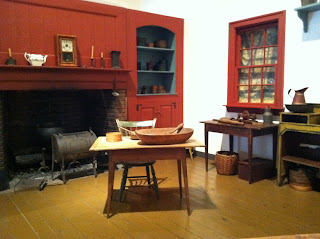When I'm not busy with my internship I am planning a wedding. Until recently I'd put off certain low priority items. Like a gift registry. I wondered what it was about getting married that suddenly necessitated additional appliances and dishes. Both of us have been living on our own for years and have acquired and accrued plenty of the basics in that time. We've cooked meals and entertained guests and lived lives like normal people and having lived without so many items until now, we felt no pressing need to get a lot more. Still, friends and family made the convincing argument that a registry at least provides a guide for guests who want to give a gift. This way you get gifts that you really need, or at the very lease might actually use. So I sucked it up, tried to maintain a healthy perspective and I registered for some essentials.
I was thinking about this today when I saw the kitchen exhibition at the Henry Ford. On display were four kitchens, dating from the 1700s to the 1930s. The first thing I noticed was how little I understood about how they might actually be used to prepare a meal. The second thing I noticed was how modest and simple they were.
 |
| Kitchen from 1700s |
 |
| Kitchen from 1830s |
 |
| Middle class kitchen from 1890s |
 |
| Middle class kitchen from 1930s |
Finally, having spent some time working at a museum years ago, I couldn't help but wonder about the intention of the curator. I imagined the ways in which an educator might present these kitchens - asking visitors to compare them, to look at the details and what they tell us about the family who lived there, what that tells us about the economics of the time, the types of meals they prepared. But as a simple visitor I found the place lacking vision. Something I'm sure Henry Ford would not have appreciated.
The Henry Ford, as it's known, is a giant complex that boasts a museum, research center, factory, historic village, IMAX theater and high school. It's just one of a long list of Ford venues in the Great Lake state of Michigan. Both Henry and Gerald Ford have lent their names to Ford Field, Ford Lake, Ford Road, Ford library and Ford airport. I'd heard about it this summer and was waiting for the right time to visit. On this sunny and warm autumn day, my daytime plans fell through and provided the perfect window of time to take a trip back in time.
 |
| After paying $22 admission, you can pay another $10 to ride the train |
Housed in an enormous building with poor lighting, the museum is divided into various sections that highlight inventions and imagination in the American experience. One section focused on agricultural innovations over time. Another had several dozen stoves. Still another showcased dollhouses from the past hundred years. One of the strangest sections focused on American pop culture beginning with the early 20th century and featured items from my own childhood, like Speak and Spell, Simon and the Mr. Professor calculator. It all really seemed more like an elaborate private collection than a museum exhibition.
 |
| Many of these are Chanukah gifts I received as a child. Now they are artifacts in a museum. |
I was looking forward to an area called "With Liberty and Justice for All" which featured the women's suffrage and civil rights movements, among others. I sat on the Rosa Parks bus and listened to a recording of Ms. Parks telling her story. And I looked around for copies of Ford's notoriously antisemitic Dearborn Independent, which surely must feature into this section of the museum that displays KKK attire. Its absence was upsetting but also not surprising. It was just another example of how this museums offered lots of kitsch but no real content, commentary or substance.
 |
| Classic or kitsch? |
I had a great day at the Henry Ford in spite of my inner critic. After a day surveying American life - everything from nickelodeons to 8 tracks to planes, trains and automobiles and - while I'm not sure if this was the curator's intention - I was reminded how much of our history is told through objects. Objects we invented and used until they faded into obsolescence with the next great invention. They tell of what we did or hoped to do. So I came home and realized that while I would like to stick with a wedding registry that sticks close to what I could really use, maybe not everything needs to be so essential.


No comments:
Post a Comment